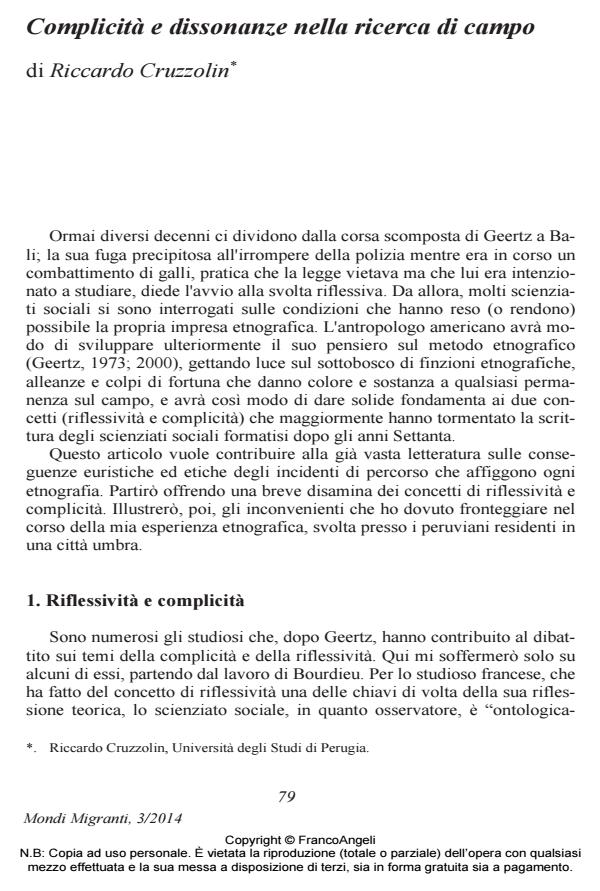Complicity and dissonances in the fieldwork
Journal title MONDI MIGRANTI
Author/s Riccardo Cruzzolin
Publishing Year 2015 Issue 2014/3
Language Italian Pages 14 P. 79-92 File size 52 KB
DOI 10.3280/MM2014-003005
DOI is like a bar code for intellectual property: to have more infomation
click here
Below, you can see the article first page
If you want to buy this article in PDF format, you can do it, following the instructions to buy download credits

FrancoAngeli is member of Publishers International Linking Association, Inc (PILA), a not-for-profit association which run the CrossRef service enabling links to and from online scholarly content.
The article aims to offer a reflection on the difficulties encountered by the author in the course of an ethnographic research he has done from 2010 to 2013, inside the Peruvian community of Perugia. Inspired by the anthropology of Geertz, but also by the suggestions of Holmes, Rosaldo and Duranti (particularly on the issues of reflexivity and complicity), the author wishes to comment on two critical moments in the history of the relationship with his informants. First of all, he wants to offer a reflection on the expectations embedded in the relationships he has established with informants, expectations betrayed by the manner in which these informants turned to him and called him. Then he wants to explain the difficulties he encountered when he wanted to involve his informants in his work. Starting from the desire to make his work more dialogic, he had, instead, to face the disappointment of some informants, who would have preferred a more upright and less dialoguing posture, as a more open attitude was destined, for them, to undermine the reliability of his work and to compromise the complicity that the informants had established with him.
Keywords: Complicity, Reflexivity, Peru, Migration, Fieldwork
- Holmes D.R. (1993). Illicit Discourse. In: Marcus G., ed. Perilous States: Conversations on Culture, Politics, and Nation. Chicago: University of Chicago Press.
- Holmes D.R. (2000). Integral Europe: Fast-Capitalism, Multiculturalism, Neofascism. Princeton: Princeton University Press.
- Lucy J. A. (2001). Reflexivity. In: Duranti A., a cura di, Key Terms in Language and Culture. Oxford: Blackwell (trad. it.: Culture e discorso. Un lessico per le scienze umane. Roma: Meltemi editore, 2002).
- Marcus G.E. (1998). Ethnography through Thick & Thin, Princeton, Princeton UP.
- Nader L. (1969). Up the Anthropologist – Perspectives Gained from Studying Up. In: Hymes D., a cura di, Reinventing Anthropology. New York: Pantheon (trad. it.: Antropologia radicale. Milano: Bompiani, 1979).
- Ortner S. (2006). Anthropology and Social Theory: Culture, Power and the Acting Subject. Durham and london: Duke University Press.
- Palumbo B. (2009). Politiche dell'inquietudine. Passione, feste e poteri in Sicilia. Firenze: Le lettere.
- Rosaldo R. (1993). Culture & Truth: The Remaking of Social Analysis. Boston:
- Beacon Press (trad. it.: Cultura e verità. Rifare l'analisi sociale. Roma: Meltemi editore, 2001).
- Scheper-Hughes N. (2002). Coming to our senses: Anthropology and Genocide.
- In: Hinton A., a cura di, Annihilating Difference: The Anthropology of Genocide. Berkeley: University of California Press. (trad. it. Questioni di coscienza. Antropologia e genocidio. In: Dei F., a cura di. Antropologia della Violenza, Roma: Meltemi editore, 2005).
- Stocking G.W. (1995). After Tylor. British Social Anthropology. Madison: The University of Wisconsin Press.
- Tedlock D. (1983). The Spoken Word and the Work of Interpretation. Philadelphia: University of Pennsylvania Press (trad. it.: Verba manent. L'interpretazione del parlato. Napoli: L'Ancora del Mediterraneo, 2002).
- Boccagni P. (2011). From rapport to collaboration . .and beyond? Revisiting field relationships in an ethnography of Ecuadorian migrants. Qualitative Research 11, 6: 736-754; DOI: 10.1177/1468794111415955
- Bourdieu P. (2004). Esquisse pour une auto-analyse. Paris: Raisons d’agir (trad. it.: Questa non è un'autobiografia. Elementi di autoanalisi. Milano: Feltrinelli, 2005). Bourdieu P. (2001). Science de la science et Réflexivité. Paris: Raisons d’agir (trad. it.: Il mestiere di scienziato. Corso al Collège de France 2000-2001. Milano: Feltrinelli, 2003).
- Bourdieu P. (1982). Leçon sur la leçon. Paris: Les Editions de Minuit (trad. it.: Lezione sulla lezione. Genova: Casa Editrice Marietti, 1991).
- Bourgoius P., Schonberg J. (2009). Righteous Dopefiend. Berkeley: University of California Press (trad. it.: Reietti e fuorilegge. Roma: DeriveApprodi, 2011).
- Duranti A. (1997). Linguistic Anthropology. Cambridge: Cambridge University Press (trad. it.: Antropologia del linguaggio. Roma: Meltemi editore, 2000).
- Fabian J. (1983). Time and the Other. How Anthropology Makes its Object. New York: Columbia University Press (trad. it.: Il tempo e gli altri. La politica del tempo in antropologia. Napoli: L'Ancora del Mediterraneo, 2000).
- Fava F. (2013). “Chi sono per i miei interlocutori?”. L'antropologo, il campo e i legami emergenti, Archivio Antropologico Mediterraneo, 15, 2: 41-58; DOI: 10.7432/AAM140101
- Geertz C. (1973). The Interpretation of Cultures: Selected Essays. New York: Basic (trad. it. Interpretazione di culture. Bologna: il Mulino, 1987).
- Geertz C. (2000). Available Light: Anthropological Reflections on Philosophical Topics. Princeton: Princeton University Press (Antropologia e filosofia. Bologna: il Mulino, 2001).
- Gudeman S., Rivera A. (1990). Conversations in Colombia. The Domestic Economy in Life and Text. Cambridge: Cambridge University Press.
- Hannerz U. (1992). Cultural Complexity. Studies in the Social Organization of Meaning. New York: Columbia University Press (trad. it.: La complessità culturale. L'organizzazione sociale del significato. Bologna: il Mulino, 1998).
Riccardo Cruzzolin, Complicità e dissonanze nella ricerca di campo in "MONDI MIGRANTI" 3/2014, pp 79-92, DOI: 10.3280/MM2014-003005